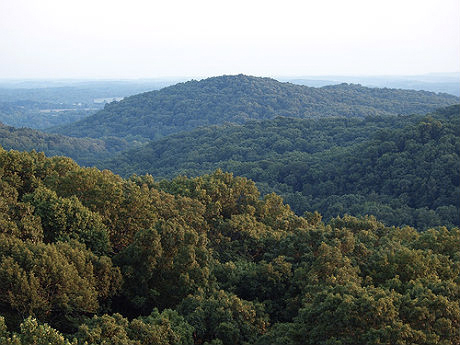
The Shawnee is Illinois' only National Forest and the state's largest tract of public land (approx. 287,000 acres). Located in the unglaciated hills of far southern Illinois, the Shawnee extends from the Ohio River on the east to the Mississippi River on the west. From oak-hickory forests, to hill prairies, to seep springs, the Shawnee is one of the most biologically diverse places in the country. More than 500 wildlife species can be found within the Forest, including 48 mammals, 237 birds, 52 reptiles, 57 amphibians, and 109 species of fish. There are seven federally listed threatened and endangered species inhabiting the Forest, as well as 33 species that are considered regionally sensitive. The Forest contains seven Congressionally-designated Wilderness Areas, four National Natural Landmarks, 10 Research Natural Areas, and more than 80 other designated Natural Areas considered important for botanical, ecological, geological or zoological reasons.
Get Involved!
The Shawnee National Forest (SNF) Campaign Committee serves to closely monitor activities and management of the Forest in order to identify threats and find solutions, as well as to promote outings and educational opportunities to one of the state's most biologically diverse areas. Volunteer opportunities abound for activists wishing to engage in the Shawnee Forest Campaign. Contact Barb McKasson, Shawnee National Forest Campaign Chair, for more information.
WILD ILLINOIS: Shawnee Campaign Committee Projects
Wilderness
The Shawnee Committee works to protect the six existing Wilderness Areas from threats such as illegal motorized vehicle use and the spread of non-native invasive species.
Forest-wide Protection
The Committee ensures that the Forest Service implements its management plans using sound forest stewardship practices that serve the public's best interests.
Non-Native Invasive Species
Invasive plants such as garlic mustard and bush honeysuckle and insects such as emerald ash borer threaten the biological diversity and integrity of the Shawnee. The Committee works closely with the Forest Service and other organizations to help educate the public about the growing problem of invasive species and to help coordinate efforts to inventory, monitor and stop their spread. We have been holding several service outings per year to pull invasive species at the Larue Pine Hills National Natural Landmark in the forest, as well as in the Bald Knob/ Clear Springs Wilderness areas. We are considering helping in other high quality areas also.
Trails Designation
The Shawnee is such a fantastic place to recreate that the Forest Service has developed a designated trail system in the most popular areas. The Committee cooperated with the Forest Service in the development of the initial Trails Designation Plan and looks forward to working on additional plans. Prior to designated trails, off-trail horse riding was causing considerable erosion and resource damage in many areas. The Committee is active in promoting the benefits of designated trails for horse riding and encourages volunteer efforts in trail building and maintenance.
Shawnee Campaign Volunteer Opportunities
Direct all inquiries about volunteer opportunities to Barb McKasson, Chair of the Illinois Chapter SNF Committee.
-
Serve on Shawnee National Forest (SNF) Campaign Committee
-
The committee stays up-to-date on the latest Forest management activities; analyzes them for compatibility with Sierra Club policy; develops positions on management proposals; drafts comments on behalf of the Club when necessary; and sends Action Alerts to volunteer activists when needed. We meet by conference call several times per year.
-
Special areas of interest include:
-
Non-native Invasive Species Control in Natural Areas.
-
Forest Restoration
-
All-Terrain Vehicle (ATV) Use: resist the push to develop ATV trails in the Forest; reform the ATV handicapped permit program.
-
Recreational and Service Outings
-
Adopt an area to monitor for trail damage, illegal ATV use, non-native invasive species, etc.
-
Volunteer for litter clean up on trails and at trailheads.
-
Participate in Chapter Service Outings in the Shawnee, or work with Shawnee Committee to organize your own outing in the Shawnee.